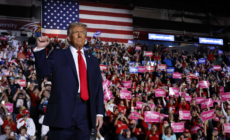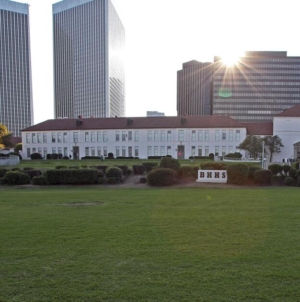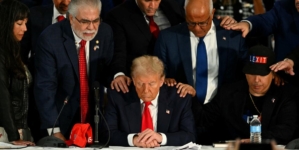-
Authorities investigating Liam Payne’s death rule out suicide in One Direction singer’s fatal fall - 15 mins ago
-
FOX’s NFL pregame show will originate from Naval Base San Diego on Sunday - 19 mins ago
-
WWE Superstar Karl Anderson Out Until Wrestlemania Due to Injury - 46 mins ago
-
Beverly Hills High limits gatherings in wake of Trump celebrations - 51 mins ago
-
Prince William says 2024 ‘has been the hardest year in my life’ - 60 mins ago
-
2024 NFL odds: AFC North sees huge shift after Thursday night result - about 1 hour ago
-
Parting Shot: Donald Trump’s Historic Week and Its Impact on Pop Culture - about 1 hour ago
-
He thought he’d found Amelia Earhart’s plane. It was a pile of rocks - 2 hours ago
-
Truckers to haul US Capitol Christmas tree from Alaska to DC, plus our latest American Culture Quiz - 2 hours ago
-
Dolly Parton wants Kate Middleton and royal family to try her cooking at Dollywood this Thanksgiving - 2 hours ago
How a Trump term could impact California’s LGBTQ+ students, financial aid
Look for changes, again, in how the Department of Education’s Office of Civil Rights operates in enforcing Title IX, the federal law that bars sex-based discrimination by educational institutions that receive federal funding; and Title VI, which prohibits bias based on race, color or national origin.
The Trump administration is expected to reverse the Biden administration’s stance that Title IX covers gender and sexual identity, which secured new protections for LGBTQ+ people.
During his campaign, Trump also made references to his desire to ban transgender student athletes from competing on sports teams that match their gender identity.
He did not specify how he would do that. But, soon after inauguration, “I would expect Trump to make a move on anti-transgender issues about transgender girls in sports,” USC education professor Morgan Polikoff said.
Conservative positions on “parental notification” could also come into play, especially in California, where Gov. Gavin Newsom signed a bill into law this year banning rules that mandate school districts to alert parents when students come out as transgender or ask to go by names and pronouns different than what is on their school records.
Proponents in several school districts, including Chino Valley Unified in San Bernardino County, say notification policies are about informing parents about all aspects of their children’s lives. Opponents deride the policies as “forced outing” that make schools less safe for LGBTQ+ people.
Trump is also likely to revert back to rules enacted during his first term — which were effectively overturned by President Biden this year — that tightened the definition of sexual harassment, raised the standard of proof for successful claims and allowed advisers for accused students to cross-examine their accusers in a live hearing.
Trump’s first-term Education Secretary Betsy DeVos said those changes were needed to provide stronger due-process protections for accused students. Critics said it would weaken the fight against campus sexual assault.
The civil rights office is also expected to more vigorously investigate complaints of antisemitism and discrimination alleged by students who claim they were denied access to programs designed to help Latino, Black, and other underserved demographic groups, for instance.
Trump and his allies have long criticized “DEI” programs — those that aim to promote diversity, equity and inclusion, which opponents see as perpetuating an erroneous and unpatriotic view that U.S. institutions are inherently racist with white people as the oppressors.
Aside from investigations, funding is another tool the Trump administration could potentially use to rein in programs or curriculum, including “critical race theory,” which they cast as anti-American, misguided “woke” efforts because they delve into systemic racism. In late 2020, Trump issued an executive order barring recipients of federal grants and contracts from engaging in “race and sex scapegoating” — specifically calling out workplace diversity trainings that linked racism to white people. The order was challenged by civil rights groups as an unprecedented effort at censorship before Biden reversed the order after taking office in 2021.
“The radical left are using the public school system to push their perverse sexual, racial, and political material on our youth,” according to Trump’s issue statement on education. “President Trump will cut federal funding for any school or program pushing Critical Race Theory or gender ideology on our children.”
Critical race theory is typically a university-level examination of how racial inequality and racism are systemically embedded in American institutions, though Trump and other conservatives have used the phrase as a catchall term to describe racially focused subject matter in K-12 public schools.
Stephanie Hall, senior director of higher ed policy for the Center for American Progress Action Fund, said it would be difficult to mandate curriculum. Under a federal law enacted in the 1960s, state and local authorities are responsible for educational standards, such as curriculum and staffing. An Obama-era law, the Every Student Succeeds Act, also prohibits federal involvement in curriculum or teacher evaluation.
But that won’t necessarily prevent Trump’s efforts to intervene, she said.
“You can expect to see a potential weaponization of the [Office of Civil Rights] to go after DEI initiatives, she said.
Source link































